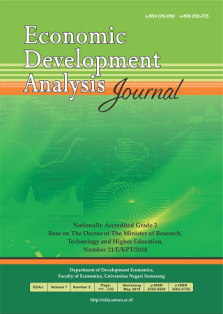Does Migration Outflow Reduce Income Inequality in the Sending Province?
Abstract
Previous studies on the association between migration outflow and income inequality have shown mixed findings. Some find that migration outflow reduces income inequality, but others find that migration outflow increases income inequality. This study aims to analyze the effect of migration outflow on income inequality in Central Java Province with two control variables: mean years of schooling and minimum wage. Central Java was chosen as the research location because it is the province with the highest migration outflow. This study uses secondary, time series data for the period 2000-2018 consisting of income inequality as measured by the Gini ratio (percent), migration outflow (people), meanyears of schooling (years), and minimum wage (rupiah). Data were obtained from BPS Central Java and analyzed with multiple linear regression. The results show that migration outflow and mean years of schooling have a negative significant effect and minimum wage has a positive significant effect on income inequality. This findings imply that migration outflow and improvement of the quality of human resources through education can be solutions to reduce poverty and income inequality, while minimum wage actually increases inequality, which may be due to the large portion of population engaging in agriculture and the informal sector.


